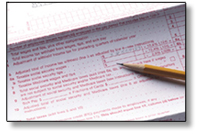 Energy Tax Credits for Homeowners and Businesses
Energy Tax Credits for Homeowners and BusinessesDuring 2006, individuals can make energy-related purchases that will provide tax benefits when filling out their tax returns next year. The credit will also be available for purchases in 2007. A recent tax law change provides a 10 percent credit for buying qualified energy efficiency improvements. To qualify, a component must meet or exceed the criteria established by the 2000 International Energy Conservation Code (including supplements) and must be installed in the taxpayer’s main home in the United States.
New Energy-Efficiency Home and Vehicle Tax Credits
 Consumers who purchase fuel-efficient hybrid vehicles, make energy-efficient upgrades to their homes will be able to take advantage of valuable federal tax credits starting in 2006. Consumers who purchase fuel-efficient hybrid vehicles, make energy-efficient upgrades to their homes will be able to take advantage of valuable federal tax credits starting in 2006. |
- Insulation systems that reduce heat loss/gain
- Exterior windows (including skylights)
- Exterior doors
Metal roofs (meeting applicable ENERGY STAR requirements).
In addition, the law provides a credit for costs relating to residential energy property expenses. To qualify as residential energy property, the property must meet certification requirements and must be installed in the taxpayer’s main home.
The following items are eligible:
- $50 for each advanced main air circulating fan
- $150 for each qualified natural gas, propane, or oil furnace or hot water heater
- $300 for each item of qualified energy efficient property.
 A new Web site from the Tax Incentives Assistance Project aims to help individuals and businesses cut their tax bills and energy bills through energy efficiency. |
The maximum credit for all taxable years is $500 – no more than $200 of the credit can be attributable to expenses for windows.
Solar Options
The new law also makes a credit available to those who add qualified solar panels, solar water heating equipment, or a fuel cell power plant to their primary homes in the United States. In general, a qualified fuel cell power plant converts a fuel into electricity using electrochemical means, has an electricity-only generation efficiency of more than 30 percent and generates at least 0.5 kilowatts of electricity.
Taxpayers are allowed one credit equal to 30 percent of the qualified investment in a solar panel up to a maximum credit of $2,000, and another equivalent credit for investing in a solar water heating system. No part of either system can be used to heat a pool or hot tub.
Additionally, taxpayers are also allowed a 30 percent tax credit for the purchase of qualified fuel cell power plants. The credit may not exceed $500 for each .5 kilowatt of capacity.
These items must be placed in service after Dec. 31, 2005 and before Jan. 1, 2008.
Tax Advice From ENERGY STAR
In collaboration with state-level energy officials, the ENERGY STAR team at the U.S. Environmental Protection Agency developed a series of factsheets on tax credits in the Energy Policy Act of 2005:
Go To the Sources
More information on tax credits for energy improvements is available from several other sources: